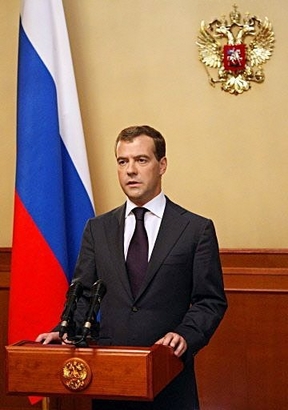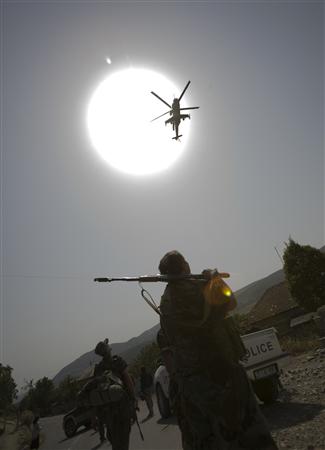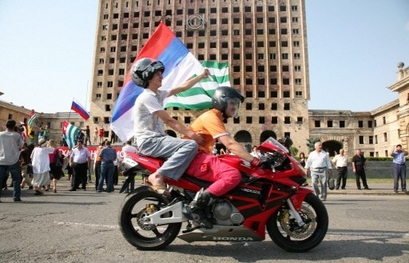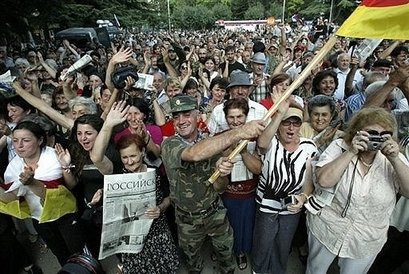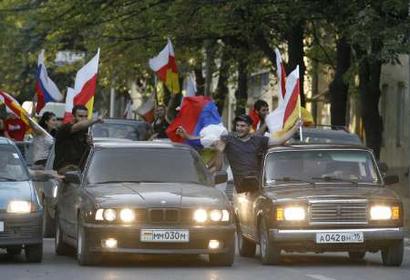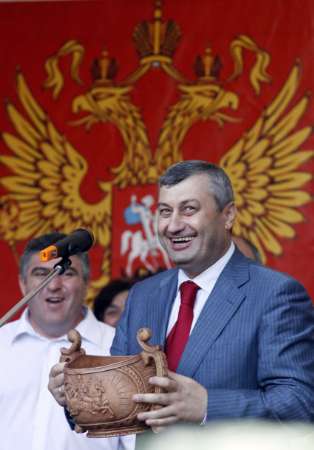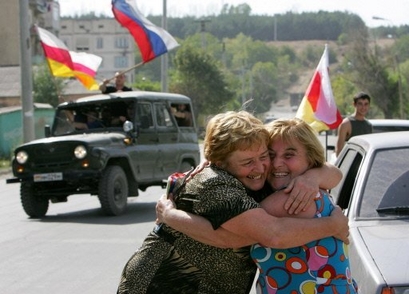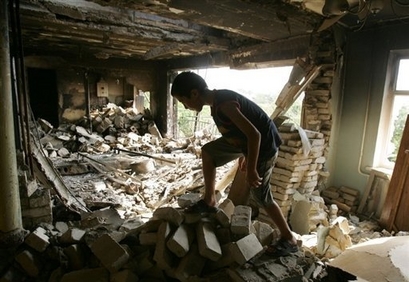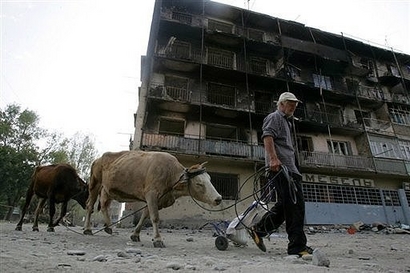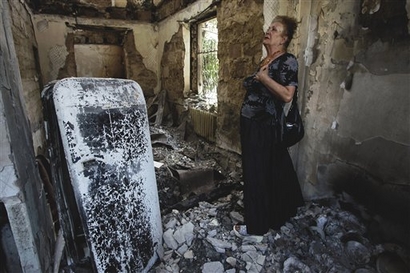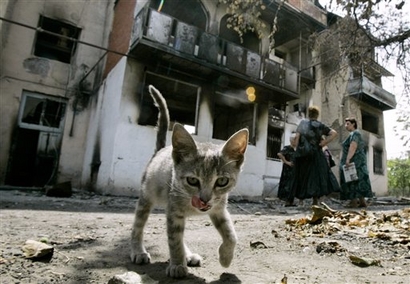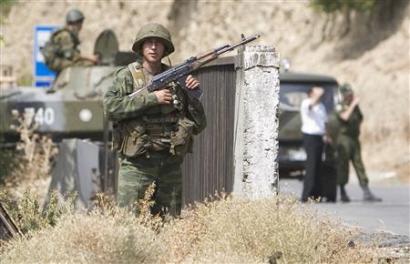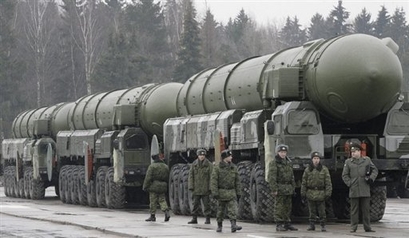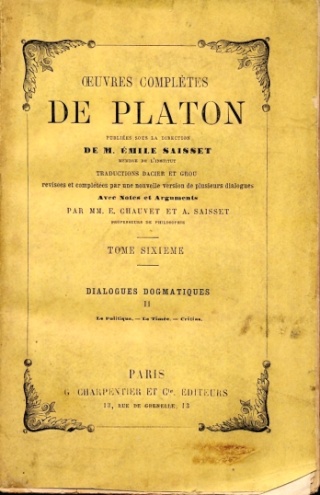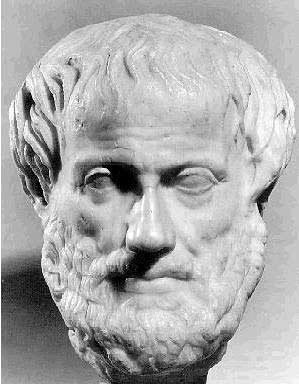War in the Caucasus is as much the product of an American imperial drive as local conflicts. It's likely to be a taste of things to come
Seumas Milne
The Guardian,
Thursday August 14 2008
The outcome of six grim days of bloodshed in the Caucasus has triggered an outpouring of the most nauseating hypocrisy from western politicians and their captive media. As talking heads thundered against Russian imperialism and brutal disproportionality, US vice-president Dick Cheney, faithfully echoed by Gordon Brown and David Miliband, declared that "Russian aggression must not go unanswered". George Bush denounced Russia for having "invaded a sovereign neighbouring state" and threatening "a democratic government". Such an action, he insisted, "is unacceptable in the 21st century".
Could these by any chance be the leaders of the same governments that in 2003 invaded and occupied - along with Georgia, as luck would have it - the sovereign state of Iraq on a false pretext at the cost of hundreds of thousands of lives? Or even the two governments that blocked a ceasefire in the summer of 2006 as Israel pulverised Lebanon's infrastructure and killed more than a thousand civilians in retaliation for the capture or killing of five soldiers?
You'd be hard put to recall after all the fury over Russian aggression that it was actually Georgia that began the war last Thursday with an all-out attack on South Ossetia to "restore constitutional order" - in other words, rule over an area it has never controlled since the collapse of the Soviet Union. Nor, amid the outrage at Russian bombardments, have there been much more than the briefest references to the atrocities committed by Georgian forces against citizens it claims as its own in South Ossetia's capital Tskhinvali. Several hundred civilians were killed there by Georgian troops last week, along with Russian soldiers operating under a 1990s peace agreement: "I saw a Georgian soldier throw a grenade into a basement full of women and children," one Tskhinvali resident, Saramat Tskhovredov, told reporters on Tuesday.
Might it be because Georgia is what Jim Murphy, Britain's minister for Europe, called a "small beautiful democracy". Well it's certainly small and beautiful, but both the current president, Mikheil Saakashvili, and his predecessor came to power in western-backed coups, the most recent prettified as a "Rose revolution". Saakashvili was then initially rubber-stamped into office with 96% of the vote before establishing what the International Crisis Group recently described as an "increasingly authoritarian" government, violently cracking down on opposition dissent and independent media last November. "Democratic" simply seems to mean "pro-western" in these cases.
The long-running dispute over South Ossetia - as well as Abkhazia, the other contested region of Georgia - is the inevitable consequence of the breakup of the Soviet Union. As in the case of Yugoslavia, minorities who were happy enough to live on either side of an internal boundary that made little difference to their lives feel quite differently when they find themselves on the wrong side of an international state border.
Such problems would be hard enough to settle through negotiation in any circumstances. But add in the tireless US promotion of Georgia as a pro-western, anti-Russian forward base in the region, its efforts to bring Georgia into Nato, the routing of a key Caspian oil pipeline through its territory aimed at weakening Russia's control of energy supplies, and the US-sponsored recognition of the independence of Kosovo - whose status Russia had explicitly linked to that of South Ossetia and Abkhazia - and conflict was only a matter of time.
The CIA has in fact been closely involved in Georgia since the Soviet collapse. But under the Bush administration, Georgia has become a fully fledged US satellite. Georgia's forces are armed and trained by the US and Israel. It has the third-largest military contingent in Iraq - hence the US need to airlift 800 of them back to fight the Russians at the weekend. Saakashvili's links with the neoconservatives in Washington are particularly close: the lobbying firm headed by US Republican candidate John McCain's top foreign policy adviser, Randy Scheunemann, has been paid nearly $900,000 by the Georgian government since 2004.
But underlying the conflict of the past week has also been the Bush administration's wider, explicit determination to enforce US global hegemony and prevent any regional challenge, particularly from a resurgent Russia. That aim was first spelled out when Cheney was defence secretary under Bush's father, but its full impact has only been felt as Russia has begun to recover from the disintegration of the 1990s.
Over the past decade, Nato's relentless eastward expansion has brought the western military alliance hard up against Russia's borders and deep into former Soviet territory. American military bases have spread across eastern Europe and central Asia, as the US has helped install one anti-Russian client government after another through a series of colour-coded revolutions. Now the Bush administration is preparing to site a missile defence system in eastern Europe transparently targeted at Russia.
By any sensible reckoning, this is not a story of Russian aggression, but of US imperial expansion and ever tighter encirclement of Russia by a potentially hostile power. That a stronger Russia has now used the South Ossetian imbroglio to put a check on that expansion should hardly come as a surprise. What is harder to work out is why Saakashvili launched last week's attack and whether he was given any encouragement by his friends in Washington.
If so, it has spectacularly backfired, at savage human cost. And despite Bush's attempts to talk tough yesterday, the war has also exposed the limits of US power in the region. As long as Georgia proper's independence is respected - best protected by opting for neutrality - that should be no bad thing. Unipolar domination of the world has squeezed the space for genuine self-determination and the return of some counterweight has to be welcome. But the process of adjustment also brings huge dangers. If Georgia had been a member of Nato, this week's conflict would have risked a far sharper escalation. That would be even more obvious in the case of Ukraine - which yesterday gave a warning of the potential for future confrontation when its pro-western president threatened to restrict the movement of Russian ships in and out of their Crimean base in Sevastopol. As great power conflict returns, South Ossetia is likely to be only a taste of things to come.
s.milne@guardian.co.uk
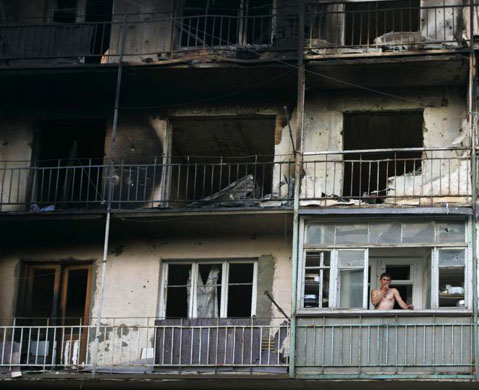 Tskhinvali, South Ossetia: An local man smokes a cigarette as he stands on the balcony of a ruined apartment block. Photograph: Dmitry Lovetsky/AP
Tskhinvali, South Ossetia: An local man smokes a cigarette as he stands on the balcony of a ruined apartment block. Photograph: Dmitry Lovetsky/AP
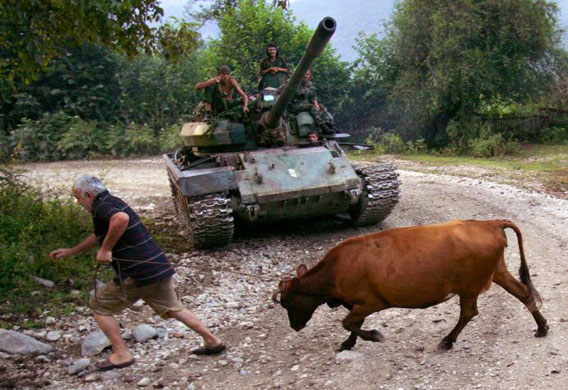 Kodori Gorge, Abkhazia: A man pulls a cow in front of an Abkhaz tank in the remote area of the breakaway region. Photograph: Viktor Drachev /AFP
Kodori Gorge, Abkhazia: A man pulls a cow in front of an Abkhaz tank in the remote area of the breakaway region. Photograph: Viktor Drachev /AFP
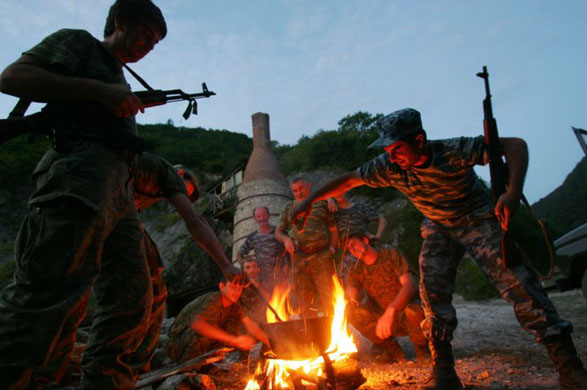 Kodori Gorge, Abkhazia: Abkhaz fighters cook food outside the town of Chkhalta. Photograph: Viktor Drachev /AFP
Kodori Gorge, Abkhazia: Abkhaz fighters cook food outside the town of Chkhalta. Photograph: Viktor Drachev /AFP
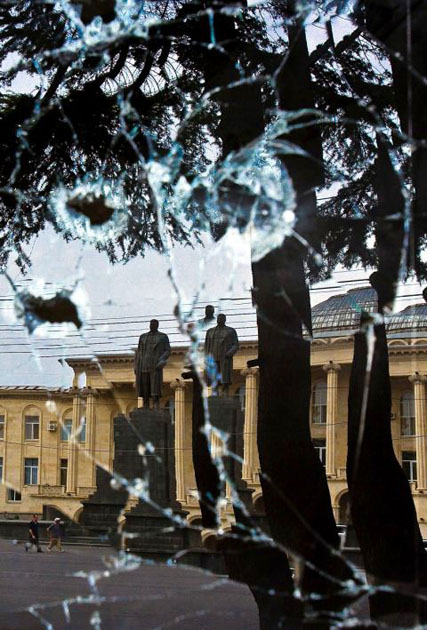 Gori, Georgia: The reflection in a broken window of a statue of former Soviet dictator Josef Stalin. Photograph: Maxim Avdeev /AFP
Gori, Georgia: The reflection in a broken window of a statue of former Soviet dictator Josef Stalin. Photograph: Maxim Avdeev /AFP
photos http://www.guardian.co.uk/world/gallery/
[En dehors des villes des "banlieues rouges" (en France, les villes socialo-communistes), la Géorgie doit être le tout dernier état au monde, même devant la Corée du Nord et Cuba, où le sanguinaire dictateur et génocidaire Joseph Staline ait encore des statues. Il a de dignes successeurs. Bien que qualifiée de "démocratie" par les Américains qui y ont fomenté des révolutions pour installer des régimes à leur botte, c'est un des derniers états staliniens d'ex-URSS]
--------------------------------------
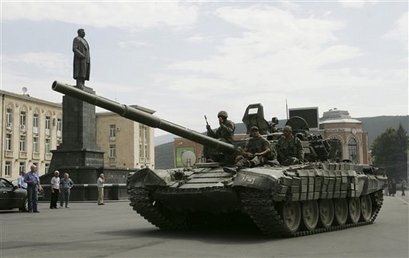
Georgian soldiers are seen atop a tank as it makes its way along a street, as a monument to Soviet dictator Josef Stalin is seen in the background, in Gori, Georgia, Monday, Aug. 11, 2008. (AP Photo/Sergei Grits)
Les Géorgiens ont même tiré sur les réfugiés dans les églises. Une barbarie telle que les musulmans locaux en ont été choqués. C'est tout dire...
Vladikavkaz, 19 August 2008, 16:09, Interfax - Georgian soldiers used an Orthodox church as a weapon emplacement when attacking South Ossetia.
"Georgian militants located its headquarters in Georgian Orthodox church in the Tskhinvali district and fired from it," chair of the Russia's Islamic cultural center Abdul-Vahed Niyazov said as he headed the Muftis' Council delegation to North and South Ossetia and met with eyewitnesses of the recent military actions.
According to him, peaceful Tskhinvali residents sheltered in the church "and were subjected to bombing and this was done on purpose."
Niyazov said that the Council of Muftis planned to urge Muslim Islamic community "to support Russian humanitarian mission completed in such a difficult situation."
Head of the Department for regional religious organizations of the Spiritual Board of Muslims of the European Part of Russia Arslan Sadriyev noted at the press conference that the country's mosques collected donations to help victims of the Georgian - South Ossetian conflict.
Sadriyev believes, the most blasphemous act was shelling Orthodox churches of South Ossetia with people sheltered in and destructing architectural sites of the Byzantium period.
------------------------------------------------
Update photographique 22-23/8 - le retrait effectif de la plupart des troupes russes hors de Géorgie. Avec d'un côté les photographes qui montrent que c'est bien réel. Et de l'autre, les journalites collègues de ces photographes qui disent le contraire de ce qu'ils voient.
source photos ci-dessous news.yahoo.com
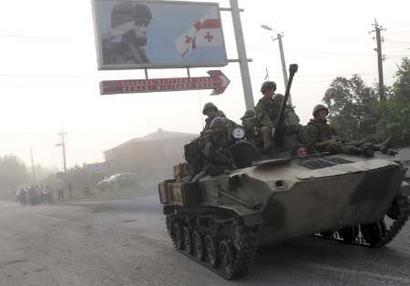
Russian servicemen atop an armoured vehicle leave the Georgian city of Senaki, August 23, 2008. All Russia's military activities in Georgia meet the conditions of a French-brokered six point ceasefire deal which ended clashes over South Ossetia, Anatoly Nogovitsyn, deputy chief of the Russian military's General Staff, said on Saturday. REUTERS/News Bridgepix (GEORGIA)
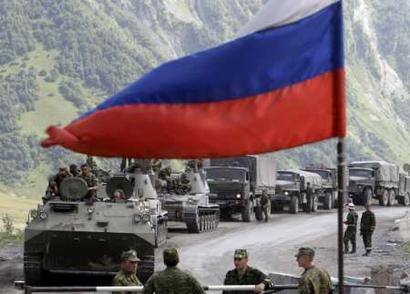
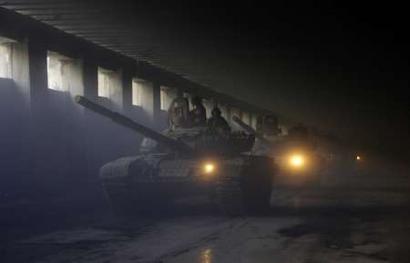
Russian tanks approach the Russian border as they drive through the northern part of breakaway South Ossetia August 23, 2008. REUTERS/Denis Sinyakov (GEORGIA)
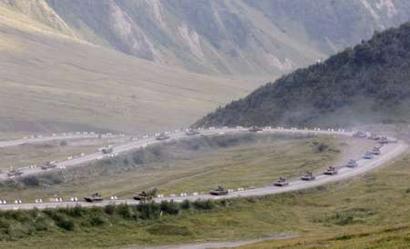
[qui lance une souscription pour offrir une paire de lunettes à GW Bush ("We see no clear move.."), N Sarkozy & co? Ces pauvres petits n'arrivent pas à voir les Russes qui se retirent après leur contre-offensive contre l'agresseur géorgien..]
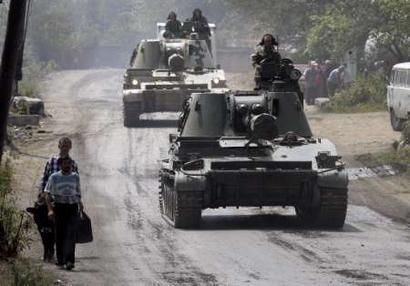
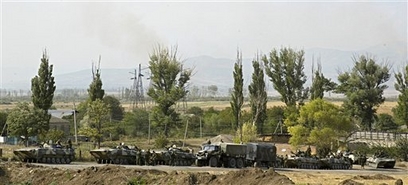
A column of Russian military vehicles is as they prepare to move back from a checkpoint around Igoeti, on the highway to Gori, Georgia, Friday, Aug. 22, 2008. Russian military convoys rolled out of positions in Georgia on Friday, signs of a promised pullback of forces that bore deep into the small former Soviet republic when war erupted two weeks ago. Igoeti, on the road between Gori and the Georgian capital of Tbilisi, had been the Russian's closest position to the Georgian capital. (AP Photo/Pascal Leopold)
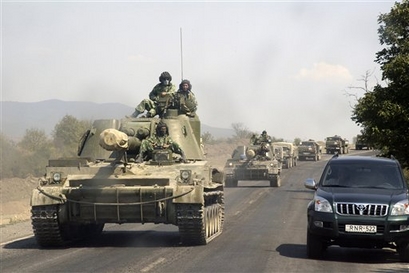
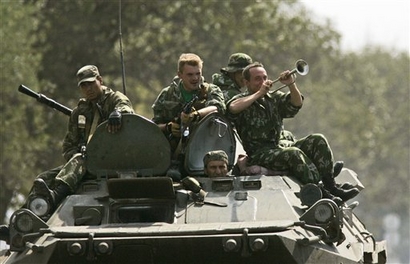
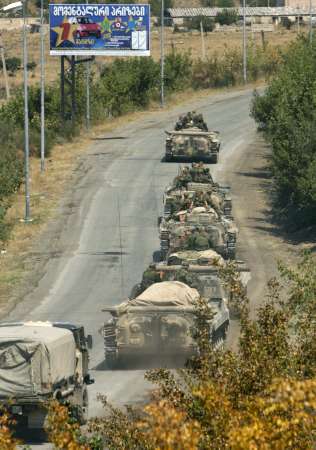
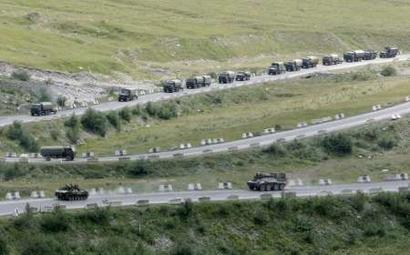
Russian military vehicles approach the Russian border as they drive through the northern part of breakaway South Ossetia August 22, 2008. Russia said it was on course to complete a partial pullback of troops from Georgia by Friday night but the United States and Germany said they had not seen clear evidence of a substancial withdrawal. REUTERS/Denis Sinyakov (GEORGIA)
[tous ces véhicules russes que les journalistes voient quitter la Géorgie sont donc trop petits pour que Merkel & Bush n'arrivent à les voir sur leur carte de monopoly?]
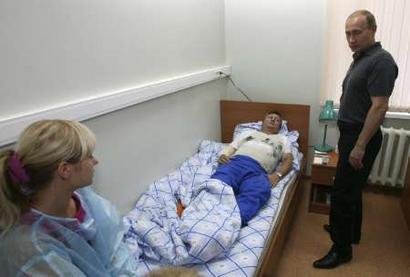
Russia's Prime Minister Vladimir Putin (R) visits Colonel Igor Zinov at a hospital in Moscow, August 23, 2008. Zinov is a Russian pilot who was shot down by Georgian air defence in the Georgian-Ossetian conflict zone on August 9. REUTERS/RIA Novosti/Pool/Alexei Druzhinin (RUSSIA)
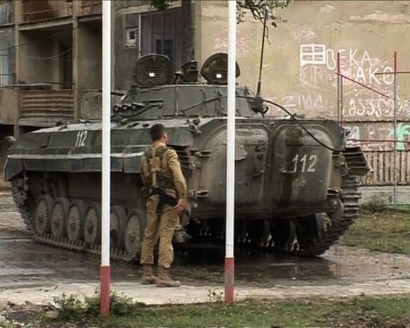
In a move largely unnoticed amid the chaos of Georgia's conflict with Russia, South Ossetian rebel forces have seized areas once firmly under Georgian control and are vowing to stay. (AFPTV)
[c'est ainsi que les médias occidentaux commentent la reprise de contrôle de leur territoire par les Ossètes du sud : une affaire de rebelles, etc..]
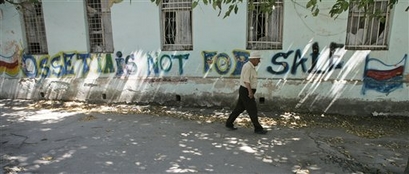
A resident walks in a street in Tskhinvali, main city of Georgia's breakaway province of South Ossetia, Saturday, Aug. 23, 2008. Tskhinvali was the site of some of the fiercest fighting between the Georgian army and South Ossetian rebels backed by Russian troops.
(AP Photogia/Dmitry Lovetsky)
[encore un mensonge de nos médias sous contrôle - comme le dénonce le journaliste du Guardian en haut d'article - car au départ, les Ossètes étaient livrés à eux-mêmes face aux agresseurs Géorgiens, qui étaient eux encadrés d'instructeurs israéliens, les instructeurs américains restant en Géorgie. Ce n'est que plusieurs heures après, une fois plus de 12 villages détruits et la capitale Sud-Ossète presque tombée, que les Russes sont intervenus. Avec l'efficacité que l'on sait. Si les Géorgiens veulent encore rejoindre l'Otan après ça, c'est qu'ils n'ont pas encore compris grand chose..]
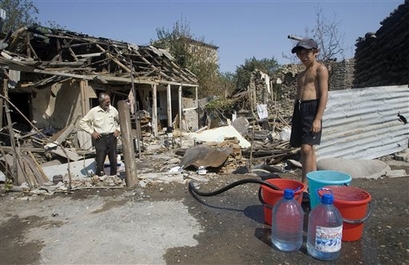
Tuzhar Kabarayev, left, stands in the courtyard of his destroyed home in Tskhinvali, the regional capital of Georgia's breakaway province of South Ossetia, Friday, Aug. 22, 2008. In South Ossetia, whose capital Tskhinvali suffered the most in fighting, Russian troops were clearly establishing a long-term presence, erecting 18 peacekeeping posts in a so-called 'security zone' around the border.
(AP Photo/Mikhail Metzel)
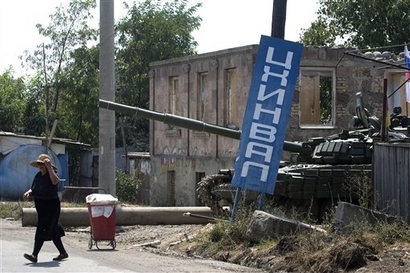
A woman is seen walking past an armored vehicle on the outskirts of Tskhinvali, the regional capital of Georgia's breakaway province of South Ossetia, Friday, Aug. 22, 2008. Sign at right reads 'Tskhinvali'. (AP Photo/Mikhail Metzel)
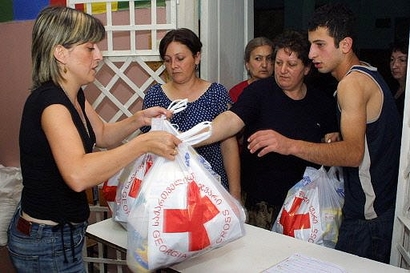
Georgian refugees receive International Red Cross humanitarian aid in Tbilisi. One of three US ships carrying relief supplies to Georgia cleared Turkish straits and headed for the Black Sea Friday, where it was due to arrive in the Georgian port of Poti in a few days. (AFP/Vladimir Valishvili)
[si ce n'était qu'une vision limitée des faits qui était ainsi présentée, quel étrange changement alors, la Croix Rouge ne s'occupant que des agresseurs, pas des agressés. Des budgets de subsides ONU dans la balance de ce choix?]
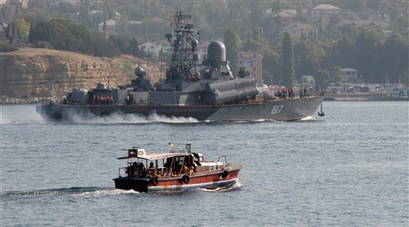
Russian missile boat 'The Mirage' enters the Black Sea port of Sevastopol on Friday, Aug. 22, 2008 in Ukraine. 'The Mirage' sank a Georgian ship during last week's war over the breakaway province of South Ossetia, and its captain received a state award in the Kremlin. (AP Photo/UNIAN, Aleksey Suvirov)
On pourrait espérer pour le retour de la paix, mais ce serait sans compter sur le Pentagone!! :
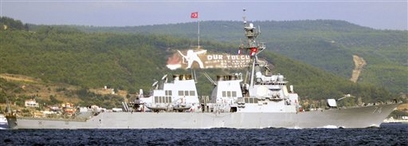
The guided-missile destroyer USS McFaul passes through the Bosphorus Strait, Istanbul, Turkey, Friday, Aug. 22, 2008. The USS McFaul is the first of three U. S. Navy ships carrying supplies such as blankets, hygiene kits and baby food to Georgia via the Turkish Straits to help the country following its war with Russia over the breakaway republic of South Ossetia. (AP Photo/Ibrahim Usta)
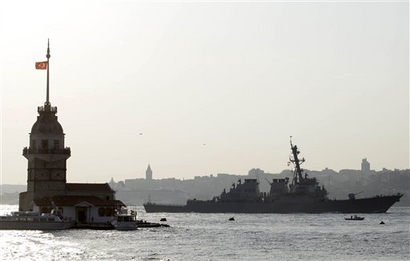
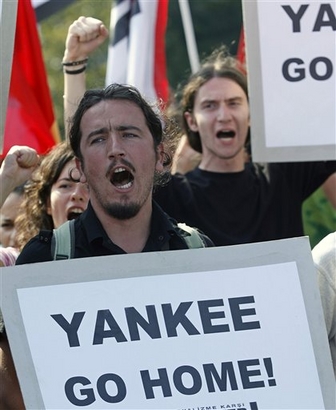
protesters, members of the 'Patriotic Front' shout anti-US slogans as the guided missile destroyer USS McFaul, sails through Istanbul's Bosporus strait, Friday, Aug. 22, 2008. The guided-missile destroyer USS McFaul is the first of three U.S. Navy ships that will carry supplies such as blankets, hygiene kits and baby food to Georgia via the Turkish Straits to help the country following its war with Russia over the breakaway republic of South Ossetia. (AP Photo/Serkan Senturk)
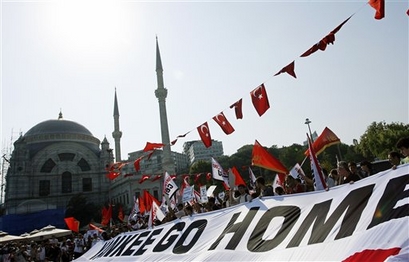
Si le gouvernement turc est bien entendu "pro-US" tant que ça lui permet d'avoir les mains libres pour son génocide de Kurdes (après celui des Grecs du Pont, des Arméniens, etc), la population de ce pays asiatique est elle largement contre les USA. Le passage du navire de guerre américain qui va en renfort pour les Géorgiens (sous prétexte humanitaire) est salué comme il se doit.
Et cet envoi de navires américains (le McFaul est le premier d'une série annoncée par le Pentagone) provoque une logique réaction de la part des Russes : ils ne se retirent pas du port géorgien de Poti, nécessaire pour la US Navy pour s'installer là, avec ses navires lances-missiles à portée du territoire russe et quelques caisses de savon et de riz humanitaires pour donner le change. La désescalade n'est pas pour demain, et comptez sur Washington pour arriver à faire gober au monde que les Russes ont "encore une fois" provoqué la situation..
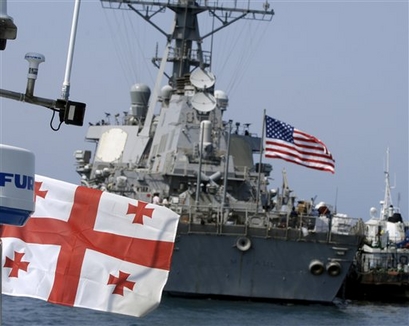
A Georgian flag flies in front of the guided-missile destroyer USS McFaul anchored in the harbor of Batumi, western Georgia, Sunday, Aug. 24, 2008. The USS McFaul is the first of three U.S. Navy ships that will carry supplies such as blankets, hygiene kits and baby food to Georgia via the Turkish Straits to help the country following its war with Russia over the breakaway republic of South Ossetia. (AP Photo/Bela Szandelszky)
Russian forces at Georgian port despite pullback
http://news.yahoo.com/s/nm/20080823/wl_nm/georgia_ossetia_dc_211
By Niko Mchedlishvili
POTI, Georgia (Reuters) - Russia said on Saturday its troops would patrol Georgia's main Black Sea port, defying Western demands for a complete pullback to positions held before this month's outbreak of fighting over a Georgian rebel region.
Moscow said it had honored a ceasefire deal by pulling back most of its forces, but troops remained deep inside Georgia on what the Kremlin calls a peacekeeping operation.
And on the main road leading to the port of Poti -- which is economically vital for Georgia -- some 20 Russian soldiers were manning a checkpoint, although not stopping traffic.
In Moscow, Anatoly Nogovitsyn, deputy chief of the Russian General Staff, said the patrols were in line with a French-brokered ceasefire that ended a conflict in which hundreds were killed and tens of thousands displaced.
Poti lies outside the security zone Russia says is covered by its peacekeeping mandate and is hundreds of kilometers (miles) from breakaway South Ossetia province, the focus of the war.
"They (Georgian forces) will drive around in Hummers, move munitions around in trucks, and are we supposed to just count them?" Nogovitsyn said after a news briefing.
Moscow says its peacekeepers are needed to prevent further bloodshed. Tbilisi and its Western allies say they will help give Russia a stranglehold over a country that lies on a transit route for energy exports from the Caspian Sea.
White House spokesman Gordon Johndroe said Russia would violate the ceasefire agreement by setting up checkpoints or permanent facilities in Georgia. Washington was seeking clarification on Moscow's latest activities.
[etc]
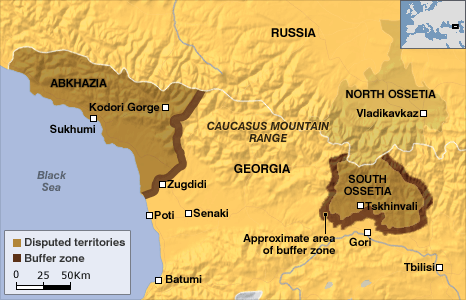
BBC: US warship reaches Georgian port
http://news.bbc.co.uk/2/hi/europe/7579506.stm
A US warship has arrived in the Georgian port of Batumi carrying the first delivery of aid supplies by sea.
Russian forces are still in control of the military port of Poti, to the north of Batumi, after Moscow withdrew most of its combat troops from the country.
French President Nicolas Sarkozy, who brokered the ceasefire, has urged Moscow to pull out those forces too.
Meanwhile, a train carrying fuel has exploded after hitting a mine near Gori, Georgia's interior ministry said.
A huge plume of black smoke could be seen across the area and witnesses said the force of the blast had forced some of the train's wagons off the tracks.
Interior ministry spokesman Shota Utiashvili said there had been several explosions near an abandoned Georgian military base where the Russian troops, on leaving Gori, had left a stockpile of munitions taken from the Georgian army.
He suggested the stockpile or the train track could have been mined by the Russian forces. He said there had been no casualties.
Georgian authorities had been hoping to help thousands of refugees return to Gori on Sunday having carried out a mine-sweeping operation in the town.
Georgia's Prime Minister Lado Gurgenidze said it would be important to see the extent of the damage, once the fire had been extinguished.
"The railway is vital, not just for the Georgian economy but for the economies of neighbouring countries," he said.
The track runs through the capital Tbilisi before splitting and running to the Black Sea ports of Poti and Batumi and south-west towards the Turkish border.
One of the train's wagons was marked Azpetrol - a company based in Baku, Azerbaijan.
Displaced
Russia's four-day war with Georgia erupted after Tbilisi tried to retake its province of South Ossetia - which broke away in 1992 and was supported by Moscow - in a surprise offensive on 7 August. The offensive followed a series of clashes between Georgian and South Ossetian forces.
The conflict left hundreds of people dead and created tens of thousands of refugees. Many have been returning to their damaged or destroyed homes since the Russian withdrawal.
The UN's refugee agency UNHCR reported this week that, according to Russian estimates, more than 30,000 people from South Ossetia had fled to North Ossetia. Another 128,000 were estimated to have been displaced within Georgia.
International aid agencies are working on the ground and the US has already delivered some aid by military cargo plane.
The destroyer USS McFaul is reported to be carrying supplies such as blankets, hygiene kits and baby food. The supplies will be unloaded by a floating crane as the port is too shallow for the ship to dock.
Two more US ships are due to arrive later this week.
The BBC's Gabriel Gatehouse, in Batumi, said that apart from delivering aid, the arrival of US naval personnel is undoubtedly intended to send a signal to the Russians - that America is serious about its support for Georgia.
But, he adds, the prospect of US and Russian armed forces actually meeting on Georgian soil is one that both sides seem keen to avoid.
Batumi is not a natural harbour for a naval vessel the size of the USS McFaul to dock but Russian forces have been fortifying their positions at the key port of Poti, further up the coast.
On Saturday, Mr Sarkozy, welcomed the withdrawal of Russian forces so far, but urged Moscow to pull its troops back from Poti and Senaki, which is the site of Georgia's main air base.
Russia says it has a duty and a right to keep its forces in a buffer zone around the breakaway territories of Abkhazia and South Ossetia - though it acknowledges that Poti falls well outside that zone.
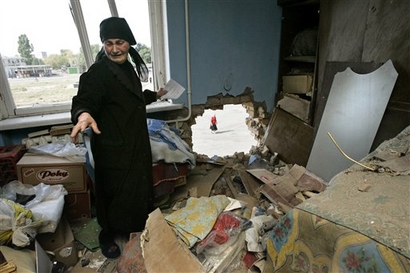
Venera Chebotaryova, 70, shows her destroyed apartment in Tskhinvali, the capital of the breakaway Georgian province of South Ossetia, Friday, Aug. 22, 2008. Chebotaryova, a half-Georgian and half-Ossetian who has lived in the South Ossetian capital of Tskhinvali for most of her life, said her Georgian neighbors had all fled in the aftermath of the latest fighting. She said Georgian President Mikhail Saakashvili, who launched an assault on the city Aug. 7, was at least partly to blame. (AP Photo/Dmitry Lovetsky)
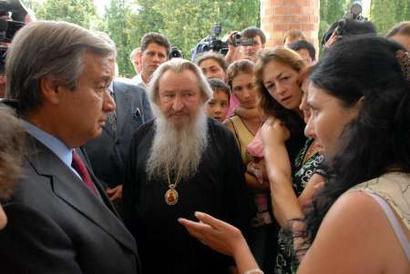
United Nations High Commissioner for Refugees Antonio Guterres (L) visits refugees and displaced persons from South Ossetia at the Alagir rehabilitation center in the Russian province of North Ossetia August 21, 2008. Guterres arrived in the capital of South Ossetia on Friday and called for the early voluntary return of refugees who fled the conflict in the rebel Georgian region. Picture taken August 21, 2008. REUTERS/A.Neshin/UNHCR/Handout (RUSSIA).
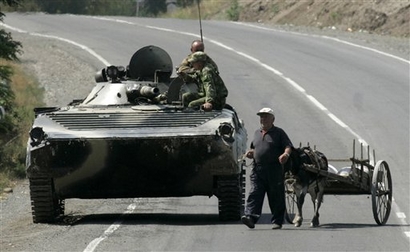
A Georgian man walks past a Russian armored vehicle near the village of Igoeti, 50 kilometers (30 miles) northwest of Tbilisi, Georgia, Friday, Aug. 22, 2008. Russian forces pulled out of positions deep inside Georgia on Friday, two weeks after thousands of troops roared into the small Caucasian nation aboard hundreds of armored vehicles. The movements came after Russia's defense minister said President Dmitry Medvedev had ordered a pullback and promised that Russian forces would withdraw to separatist regions and surrounding security zones by the end of Friday. (AP Photo/Sergei Grits)
[on se rappelera que les Américains avaient promis de quitter en 2008 l'Iraq, qu'ils ont envahi sans mandat ONU à 2 reprises en 10 ans. Ils viennent de signer un nouvel accord de dégager leurs troupes d'occupations pour 2010. Et ils viennent prétendre donner des leçons de morale politique aux Russes...]
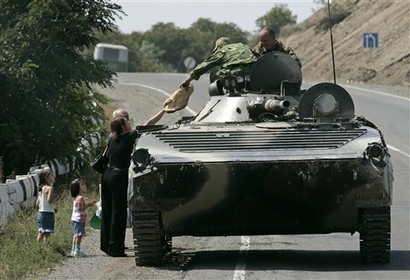
Russian soldiers give bread to a Georgian woman near the village of Igoeti, 50 kilometers (30 miles) northwest of Tbilisi, Georgia, Friday, Aug. 22, 2008. (AP Photo/Sergei Grits)
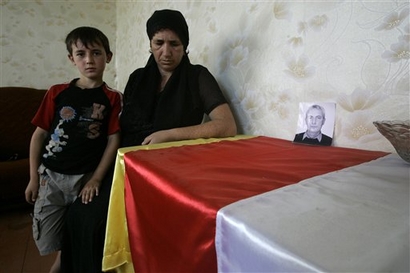
Angelina Valiyeva, 44, her son Irbek, stand by a portrait of her husband Garik, who was killed during an assault on the town by Georgians in Tskhinvali, Georgia, Friday, Aug. 22, 2008. When Georgian rockets came pouring down on this sleeping capital of the breakaway province of South Ossetia, Valiyeva and her family ran to a century-old synagogue. For four days, she and several dozen residents hid in its dark basement with scarce food and water, cupping their hands around the mouths of their terrified children when Georgian soldiers approached. (AP Photogia/Dmitry Lovetsky)
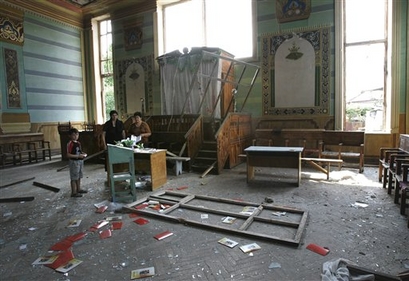
People view a damaged synagogue in Tskhinvali, Georgia, Friday, Aug. 22, 2008. (AP Photogia/Dmitry Lovetsky)
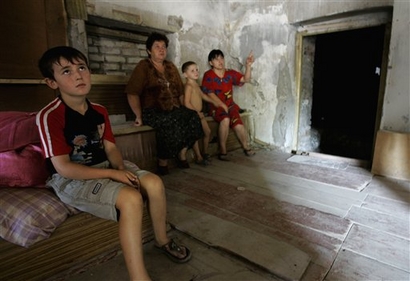
People rest in a basement of a destroyed synagogue, where they sought shelter during an assault on the town and remain after their house was destroyed, in Tskhinvali, Georgia, Friday, Aug. 22, 2008. When Georgian rockets came pouring down on this sleeping capital of the breakaway province of South Ossetia, people ran to a century-old synagogue. For four days, several dozen residents hid in its dark basement with scarce food and water, cupping their hands around the mouths of their terrified children when Georgian soldiers approached. (AP Photogia/Dmitry Lovetsky)
[Comme on l'a lu plus haut, même les musulmans ont dénoncé le comportement barbare des envahisseurs Géorgiens, qui ont été jusqu'à tuer les gens réfugiés dans les églises.. si les mulsulmans eux-mêmes trouvent que les alliés de Sarkozy, Merkel et Bush sont de vrais barbares, faut pas demander...]
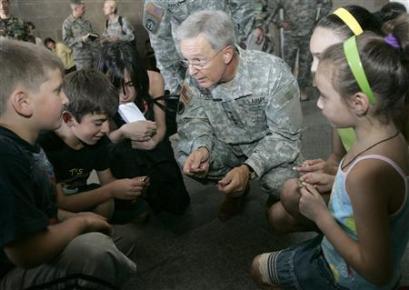
U.S. General John Craddock, NATO's top operational commander (C), meets Georgian refugees at a temporary shelter in Tbilisi August 21, 2008. (David Mdzinarishvili/Reuters)
[Il n'y a pas de bonne ou mauvaise victime, et ceux-là le sont des victimes; cependant, il est nécessaire de bien rappeller qu'ils sont d'abord et avant tout victimes de la folie meurtrière de leur cher président Saakashvili, qui a lancé son aventure génocidaire contre ses voisins Abkhaze et Ossètes, s'attirant la riposte puissante de leurs protecteurs moscovites. Qui sème la tempête.. On s'étonnera dès lors que le responsable de l'Otan n'ait pas même un regard pour les victimes directes de l'agression, les Ossètes..]
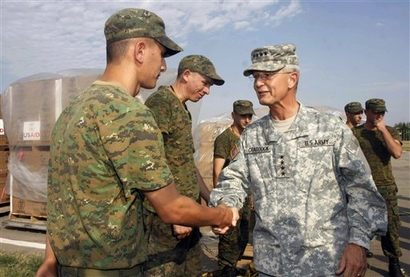
NATO's supreme allied commander for Europe, U.S. Gen. John Craddock, right, shakes hands with Georgian soldiers unloading U.S. humanitarian aid at Tbilisi airport on Friday, Aug. 22, 2008. Russian troops manned checkpoints and controlled traffic on major highways across Georgia on Friday, Russian military trucks roamed the roads freely and Russian military helicopters buzzed overhead.
(AP Photo/George Abdaladze)

Servicemen unload humanitarian aid from a U.S. military cargo plane at an army base in Tbilisi August 22, 2008. Russian military checkpoints being built in the area adjacent to Georgia's breakaway region of South Ossetia will be permanent, a senior Russian military official said on Friday. REUTERS/Gleb Garanich (GEORGIA)
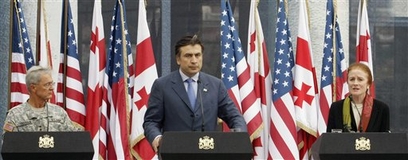
Georgian President Mikhail Saakashvili, center, U.S. Gen. John Craddock, left, NATO's supreme allied commander for Europe, and USAID administrator Henrietta Holsman Fore, right, are seen during a joint news conference in Tbilisi, Georgia, Thursday, Aug. 21, 2008.
(AP Photo/Georgy Abdaladze)
[il faudrait rajouter "wanted for warcrimes" sous cette photo...]
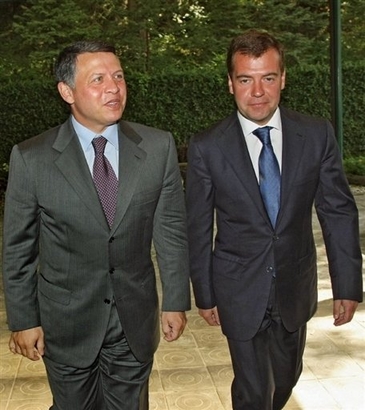
Jordan's King Abdullah II (left) holds talks with Russian President Dmitry Medvedev in Sochi. Medvedev thanked King Abdullah II for offering humanitarian aid to South Ossetia. (AFP/Ria Novosti/Vladimir Rodionov)
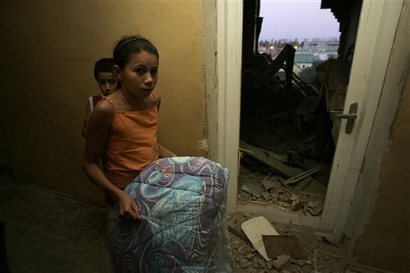
South Ossetian children seen in their ruined flat in Tskhinvali, THE main city of Georgia's breakaway province of South Ossetia, Saturday, Aug. 23, 2008. Tskhinvali was the site of some of the fiercest fighting between the Georgian army and South Ossetian rebels backed by Russian troops. (AP Photogia/Dmitry Lovetsky)
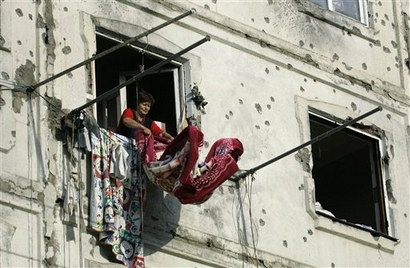
A local resident shakes out a blanket in Tskhinvali, the main city of Georgia's breakaway province of South Ossetia, Saturday, Aug. 23, 2008. (AP Photogia/Dmitry Lovetsky)
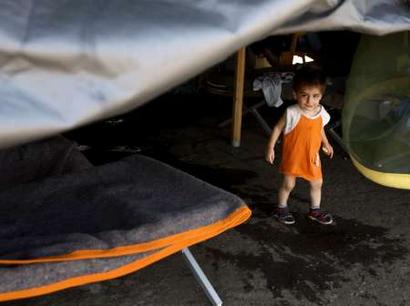
A child walks in a tent in a refugee camp for people displaced during the conflict in South Ossetia, in Tbilisi August 22, 2008. REUTERS Gleb Garanich (GEORGIA)
A woman feeds a child in a refugee camp for people displaced during the conflict in South Ossetia, in Tbilisi August 22, 2008.
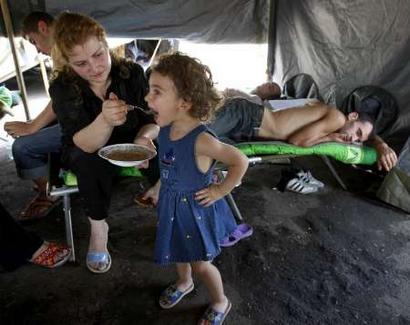
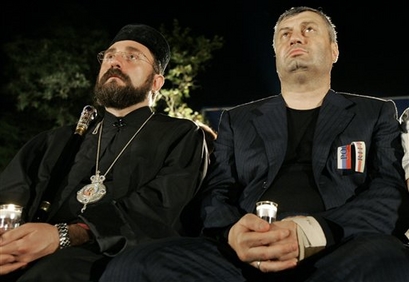
South Ossetian leader Eduard Kokoity, right, and a priest hold candles during a concert conducted by Valery Gergiev in Tskhinvali, Georgia's breakaway province of South Ossetia, Thursday, Aug. 21, 2008. In front of a half-destroyed government building, on a plaza flanked by armored personnel carriers, Russian conductor Valery Gergiev who is Ossetian, led a requiem Thursday for South Ossetia's victims of war. (AP Photo/Dmitry Lovetsky)
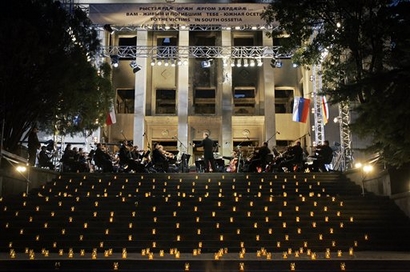
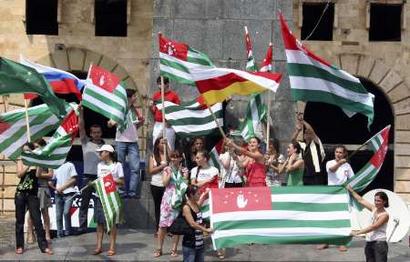
People display flags of Georgia's breakaway region of Abkhazia during a rally in its main city of Sukhumi August 21, 2008. South Ossetia will ask the Kremlin to recognise its independence from Georgia, the leader of the breakaway region told a rally including widows and mourning mothers in his war-ravaged capital on Thursday.
REUTERS/Vladimir Popov (GEORGIA)
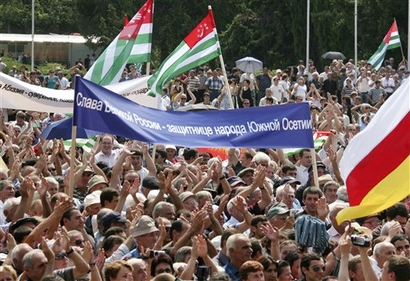
Tens of thousands of Abkhazians rally in downtown Sukhumi, capital of Georgian breakaway province of Abkhazia on Thursday, Aug. 21, 2008. Participants of the rally demanded independence from Georgia. The slogan reads: Glory to Great Russia- Defender of the People of South Ossetia. (AP Photo/ Vladimir Popov)
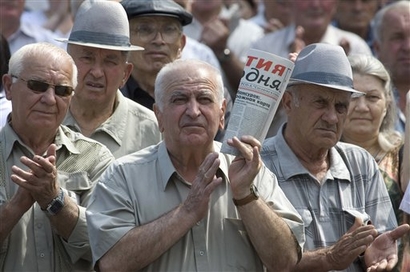
North Ossetians applaud during an a meeting against Georgian aggression in the center of Vladikavkaz, capital of North Ossetia, Russia, Thursday, Aug. 21, 2008. (AP Photo/Mikhail Metzel)
Alors, "happy end" en vue, malgré l'arrivée des navires militaires US et des envois d'approvisionnements militaires cachés dans des envois humanitaires? Hélas, non, justement! Les Géorgiens, forts du soutien des USA et de leurs sbires, semblent bel et bien, ce dimanche, prêts à relancer la guerre. Et auraient déjà commencé à tirer sur la république d'Ossétie du sud.. Probablement un addendum non-public du traité de cesser-le-feu négocié par Sarkozy?...
15:12 24 août 2008
(Belga) Les Géorgiens concentrent des unités et du matériel lourd à la frontière avec leur république séparatiste d'Ossétie du Sud, a affirmé dimanche une porte-parole des séparatistes sud-ossètes, Irina Gagloeva.
"La partie géorgienne a commencé à se renforcer militairement le long de la frontière avec le district de Leningor (Akhalgori en géorgien, ndlr). Des unités militaires et du matériel lourd y sont concentrés", a déclaré Mme Gagloeva. Des forces géorgiennes ont tiré dans la nuit de samedi à dimanche en direction de villages du district, faisant fuir les habitants, a ajouté la porte-parole du gouvernement séparatiste à Tskhinvali, la capitale de l'Ossétie du Sud. Tskhinvali envisage de demander en conséquence aux soldats russes de maintien de la paix de renforcer leur présence le long de la frontière avec la Géorgie, a ajouté un autre membre du gouvernement sud-ossète, Boris Tchotchiev. (NLE)
----------------------
la seule "bonne nouvelle" par rapport à cette guerre crapuleuse lancée par Washington contre la Russie via Géorgie & Ossétie, c'est que les Serbes n'ont pas (encore) été attaqués comme initialement prévu. Les plans étaient secrets de polichinelle, les JO devaient être le bon moment. Mais les Russes ont réagit plus fort et mieux que prévu, et le matos amerloque et tous les conseillers militaires amerloques & israéliens n'ont rien su faire: les soldats russes ont battu les soldats géorgiens à plate couture.
Espérons que ces monstres de Washington ne vont pas, de dépît, attaquer à nouveaux les Serbes qui résistent encore dans leur province du Kosovo. D'autant que la Serbie a bien compris cette fois que se coucher devant les diktats US ne la sauverait pas du dépeçage. Et sa province historique du Kosovo, elle y tient!
"I believe the European Union will not force Serbia to change its principled position on Kosovo in order to join the EU. I do not expect this. But if you suppose hypothetically that this might happen, Serbia will say 'no'," Jeremic said.
Asked how the possible deployment of an EU police mission in Kosovo without a UN Security Council sanction could affect Serbia's relations with the EU, Jeremic said, "Serbia is not against the EU's presence in this or that form in the entire territory of Serbia, including Kosovo. But we believe that the presence of an EU mission in Kosovo should be sanctioned by the UN Security Council."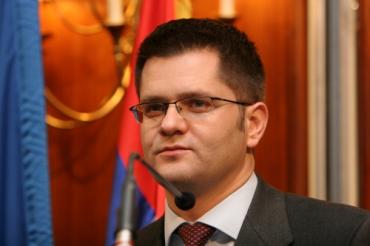
"We are prepared to hold negotiations with the European Union to reach a consensus on a structure that would be acceptable to us and that would be approved by the UN Security Council. A significant number of European states share our position," he said.
Talking about the settlement of the Kosovo problem, Jeremic said, "Serbia will accept any decision that would not call its sovereignty and territorial integrity into question."
Belgrade is also willing "to grant as broad powers as possible to Albanians in Kosovo in resolving their internal problems," he said.
"However, if you want to be realistic, it is extremely important today to take a number of tactical steps that would have strategic implications," Jeremic said.
In particular, the minister mentioned among such measures hampering Kosovo's accession to any international organization and working so that as few countries as possible recognize Kosovo's independence.
"We are seeking to have the very idea of Kosovo's independence proven stillborn," he said.
"And when everybody sees that Kosovo failed to gain real and practical confirmation of its independence in a violent way, then the need will arise to return to the negotiating table," he said.
"We need to be very patient, principled, and vigilant today. This is the only way for us to attain the desired result," he said.
Belgrade expects the people responsible for crimes described in a book by Carla Del Ponte, a former prosecutor for the International Criminal Tribunal for the former Yugoslavia (ICTY), will be found and brought to justice, also said Jeremic.
"This book [entitled The Hunt: I and War Criminals] makes horrible accusations. We are expecting now that some light will be shed on this story," Jeremic said.
"The way the Hague Tribunal has been working lately prompts a lot of questions and causes mistrust," Jeremic said.
He, however, suggested that "all the trials should be brought to an end as soon as possible."
"Not so many cases are left to be considered by the court," he added.
Several people who will have to defend themselves at the ICTY are still at large, Jeremic said. "I hope this will soon end and become part of the past," he said.
Carla Del Ponte alleged in her book, which was published in spring 2008, that about 300 young Serbs and other non-Albanians were abducted in 1999 by leaders of the Kosovo Liberation Army and transferred to Albania, where their organs were extracted to be sold in foreign countries. Hashim Thaci, the current prime minister of Kosovo, figures in the book in connection with these alleged crimes.
Serbia will continue to insist on the extradition of Mirjana Markovic, the widow of former Yugoslav President Slobodan Milosevic, and his son, Marko, who are currently living in Russia, Serbian Foreign Minister also said.
"Certain members of Slobodan Milosevic's family need to answer to the charges brought against them by a Serbian court. Demanding third countries where the suspects are living that they extradite them is quite a natural and appropriate procedure," Jeremic said.
He acknowledged that Mirjana Markovic's and Marko Milosevic's lawyers succeeded in having some charges initially brought against them dropped, but "other charges remain in force," he said.
The Russian Federal Migration Service had said in February that Russia did not have reasons to extradite the former Yugoslav leader's widow and son.
"Any state can request their extradition, but Russia does not have reasons to extradite them, and this is based on international conventions and agreements. We won't extradite them. They have been granted refugee status in Russia," Federal Migration Service spokesman Konstantin Poltoranin said.
It was the Serbian Justice Ministry that had originally demanded Mirjana Markovic's and Marko Milosevic's extradition.
According to the Russian Federal Migration Service, Mirjana Markovic and Marko Milosevic had been granted refugee status in Russia in March 2006.
-----------------------------------
Certains aux USA, hélas ayant trop peu de place médiatique, semblent être bien conscients que les choses sont en train de basculer. Deux décennies de positions ultra-agressives de Washington contre le monde entier en général, et contre la Russie en particulier, ont créé un mouvement de profond ressentiment. Le dédain que Moscou fait des rodomontades de Washington dans cette affaire de génocide géorgien contre les populations russes d'Ossétie le montre à l'envi : les choses changent. Et il y a consensus national en Russie : assez des humiliations occidentales!
By Thomas Omestad
Posted August 22, 2008
Russia's military occupation of parts of neighboring Georgia has sent a decisive signal that the Kremlin intends to behave as great powers traditionally have done—forcefully pursuing their interests where they can.
Moscow may now pull back troops to the separatist Georgian enclaves of South Ossetia and Abkhazia, if not yet all the way back to Russia. But the display of Russian power will likely have lasting consequences for relations between the principal heir to the Soviet legacy and the United States.
This does not necessarily portend a new Cold War. That wouldn't be in Russia's interests, given its economic engagement with the West, and today's Russia has neither the ideological presence nor the appeal that the old Soviet Union held in some parts of the world. Practically, Moscow has serious constraints on its ability to project military power globally, though it still fields a sizable nuclear arsenal.
What has changed is that Russia, impoverished after the Soviet breakup, has been re-energized by state-encouraged nationalism and booming oil and natural gas revenues. Free of the need for Western largesse and with its military machine on the mend, Moscow enjoys a freedom of action that would have seemed unlikely when President Bush took office in 2001.
U.S. officials acknowledge a new perspective. "My view is that the Russians—and I would say principally Prime Minister [Vladimir] Putin—are interested in reasserting not only Russia's great power or superpower status but in reasserting Russia's traditional spheres of influence," Defense Secretary Robert Gates said recently. "Everyone is going to be looking at Russia through a different set of lenses as we look ahead."
Graham Allison, a former Pentagon official and defense thinker who heads the Belfer Center for Science and International Affairs at Harvard University, sees a pattern in Russia's moves on Georgia. "As a first approximation, this is consistent with the behavior of great powers," he says. As for Georgia, he adds, "A little guy attacking a big guy usually gets his nose broken."
The plunge in U.S.-Russian relations to their lowest point since the collapse of the Soviet Union in 1991 may be particularly galling to Gates, who spent much of his early career as a CIA analyst on Soviet affairs. Likewise, his counterpart at the State Department, Condoleezza Rice, is trained as a Russia scholar and speaks Russian.
Rice has warned Moscow not to go deeper into Georgia and topple the pro-Western elected government led by Mikheil Saakashvili. She warns that today's Russia, which has forged stronger economic ties with the world, could not evade the consequences, as the USSR did after its infamous 1968 invasion of Czechoslovakia to quash a democratic opening there.
The precise interplay between Saakashvili's decision to send Georgian forces into pro-Russian South Ossetia and the Russian counterthrust is still being debated. But once underway, the Russian invasion dramatically symbolized an emboldened Kremlin. "They clearly want to demonstrate that Russia is back as a great power and should be taken seriously," says Dimitri Simes, president of the Nixon Center in Washington and a leading Russia-watcher.
Russia's willingness to risk international condemnation reflects a deeply felt set of resentments against the West—and the Bush administration in particular. The reigning, if disputed, narrative in Moscow is of a historically great power that was systematically humbled in its period of weakness by an overbearing U.S. government.
There are numerous elements to that narrative, and they date to the Clinton as well as the Bush administration. Among them: NATO's expansion into parts of the former Soviet Union over Russian objections; the U.S.-led war on fellow Slavs in Serbia in defense of ethnic Albanians in Kosovo; U.S. support for the prodemocracy "color revolutions" in Georgia and Ukraine; Bush's withdrawal from the landmark antiballistic missile treaty to allow for missile defenses that could handicap Russia; and the U.S. plan to build elements of a missile defense shield in the Czech Republic and Poland.
U.S. officials say the missile defense project is a response to a future Iranian nuclear missile threat to the United States and its allies and is not a shield against Russia. But the Russians see it differently. Last week, they harshly denounced the a newly signed U.S. accord with Poland that will have the U.S. deploy a battery of Patriot air-defense missiles.
To top that off, Russian authorities are impatient with what they regard as years of moralistic American hectoring about creeping Russian authoritarianism.
U.S. aid and training for the Georgian Army, coupled with the anti-Russian taunts of what Moscow regards as an American client, intensified the Kremlin's disaffection. Moscow also objected to U.S. backing this year for an independent Kosovo and an effort to put Georgia and Ukraine on track for future NATO membership.
It was not just Putin who accumulated these grudges. "There is a public consensus that Russia was humiliated," says Simes. "They felt they had very little to lose."
In Washington, the impressively high-level expertise on Russia seemed to do little to forestall a crisis.
Bush has consistently seemed far more comfortable with promoting the principles of democracy, freedom, and free markets than he has with the less lofty business of calibrating foreign policy to respond to Russia's predictable interests. "The preaching and perceptions belie a naiveté, even a degree of delusion" about the building Russian-Georgian tensions, Allison argues.
The problem extends to the top echelons of the administration, according to Simes, who says that Rice neglected the early, internal warnings from senior American diplomats that any Georgian move into South Ossetia—such as what happened two weeks ago—would trigger a major Russian response.
Several factors are making it more difficult to craft an effective U.S. response. Talking with Moscow has grown more complicated because there is a new president, Dmitry Medvedev, but Putin, the former president and current prime minister, is still calling the shots.
The old pattern of disagreements between administration hard-liners and moderates has also reappeared, with get-tough advocates from Vice President Cheney's office said to be favoring moves to bolster Georgia's defenses.
Though the U.S. hard-liners may place stock in efforts to isolate Russia, the Europeans are mostly skeptical. They tend to see Saakashvili as impetuous and partially to blame for the current crisis, and they see no good alternative to continuing to engage even a surly Russia. Despite Russia's aggressiveness, the European sense is that their nations must share a continent with Russia and will continue to depend on it for energy.
Moreover, Russia could respond to pressure by making trouble on a variety of fronts for the Bush administration and its successor. Washington will need Moscow to prod and cajole Tehran if the collective effort to restrain Iran's nuclear drive is to succeed. The same need holds, to some degree, in regard to attempts to denuclearize North Korea. Russia is an important link in the chain of international cooperation against terrorism and organized crime, and it has the capacity to buck up foes of the United States from Serbia to Syria to Venezuela. A sale of sophisticated Russian weaponry to Hugo Chavez's Venezuela or to Mahmoud Ahmadinejad's Iran would create significant security issues for the next administration.
Says Allison, "The relationship is going to be dragged back into the reality zone." An angry Russia, it seems, has many more unpleasant cards to play, if it chooses to serve as a spoiler.
Le Guardian est très lucide, on est bel et bien en présence d'une nouvelle phase des annexions militaires de Washington. Et l'usage très pointu de la guerre médiatique permet de prolonger l'illusion chez le téléspectateur occidental, américain ou européen, trop intoxiqué par la désinformation officielle pour encore chercher à y comprendre quoi que ce soit. Et puis, il y a les JO, n'est-ce pas?
Alors faisons simple avec une seule question : les troupes US se sont-elles retirées d'Afghanistan, d'Irak, de Serbie, 3 pays où elles sont installées par invasion militaire américaine non-cautionnée par l'ONU?
Réponse : non.
Comme Platon le rappelera souvent, Socrate avait bien analysé la manière dont Athènes était tombée. Son rejet de la vie traditionnelle, son invention de la "démocratie" où le pouvoir était soumis à l'opinion et remis à des nuls sachant bien parler, les ferments étaient là. Puis la ligue qu'Athènes avait suscitée autour d'elle, pour contrer Sparte, cité modèle quant aux moeurs et à la morale politique. Puis, constatant que le nombre lui donnait la force, mais que les alliés n'étaient pas assez maléables, elle avait finit par les envahir un à un. Gagnant en puissance grâce aux fantoches à sa solde installés au pouvoir, mais augmentant dangereusement la haine des soumis contre elle. Puis se retrouvant avec tant de haine dirigée contre elle, qu'elle fut envahie et vaincue.
Qu'on analyse les choses comme on veut, mais on retrouve bel et bien ce comportement chez les dirigeants américains. Le drame étant qu'en finale, ces amoraux politiciens & marchands d'armes seront peut-être vaincus, mais leur peuple aura beaucoup plus à en souffrir qu'eux. Et pour parvenir à les détruire, ces nuisibles "dictateurs démocratiques" de Washington, beaucoup de sang aura coulé sur la planète. Qui n'en a déjà que trop reçu depuis Caïn et Abel..

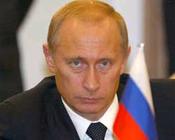 Just before the EU extraordinary meeting, with accusations being launched from both sides and warships sailing in the Black Sea, Russia and the West continue playing a tough diplomatic game on the developments in Caucasus. In an interview with ARD German TV Network, Russian PM Vladimir Putin launched acusations agains the US. He accused the US of sending military advisers in Georgia to train the Georgians on the use of arms. They were also present at military operation zones. This may lead to the conclusion that the US leadership knew about the actions being prepared and possibly took part in them. If the US leadership was part of this then it I suspect he did it to orchestrate a small victorious war.
Just before the EU extraordinary meeting, with accusations being launched from both sides and warships sailing in the Black Sea, Russia and the West continue playing a tough diplomatic game on the developments in Caucasus. In an interview with ARD German TV Network, Russian PM Vladimir Putin launched acusations agains the US. He accused the US of sending military advisers in Georgia to train the Georgians on the use of arms. They were also present at military operation zones. This may lead to the conclusion that the US leadership knew about the actions being prepared and possibly took part in them. If the US leadership was part of this then it I suspect he did it to orchestrate a small victorious war.
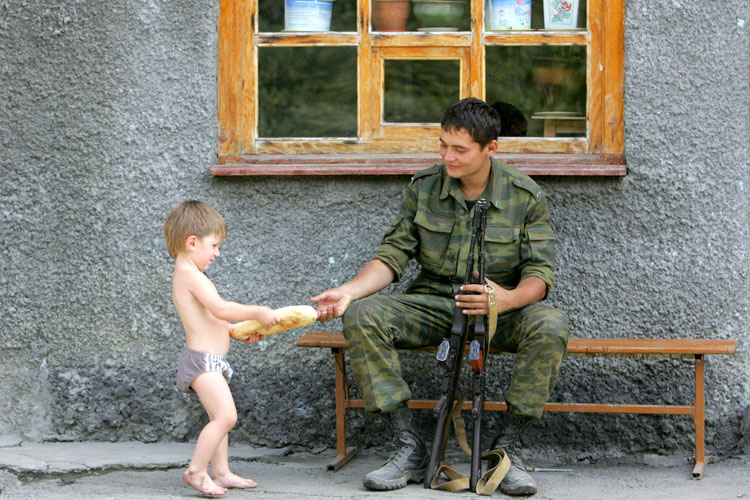 Liebesdienst für einen "Freund": Ein kleiner Junge im südossetischen Zchinwali brachte am Montag einem russischen Soldaten zur Feier des Tages ein Brot. Das russische Parlament hatte gerade die Anerkennung der Separatistenregion beschlossen.
Liebesdienst für einen "Freund": Ein kleiner Junge im südossetischen Zchinwali brachte am Montag einem russischen Soldaten zur Feier des Tages ein Brot. Das russische Parlament hatte gerade die Anerkennung der Separatistenregion beschlossen.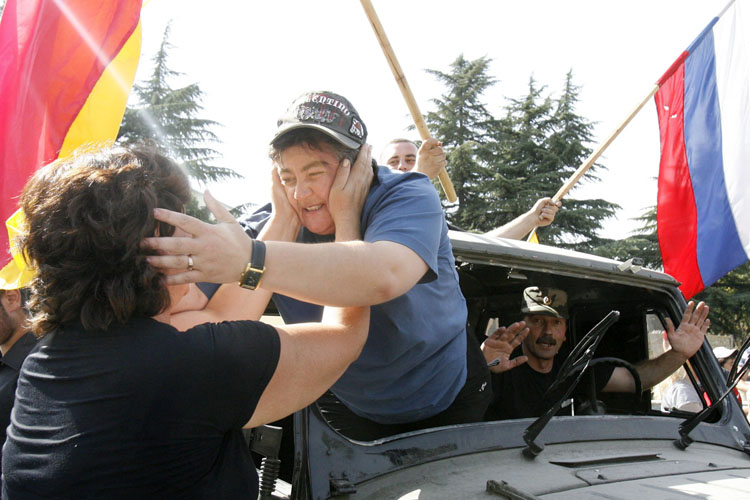 Freudentaumel: Südosseten schließen sich in die Arme. Sie feiern die Anerkennung der abtrünnigen georgischen Region durch Russland.
Freudentaumel: Südosseten schließen sich in die Arme. Sie feiern die Anerkennung der abtrünnigen georgischen Region durch Russland.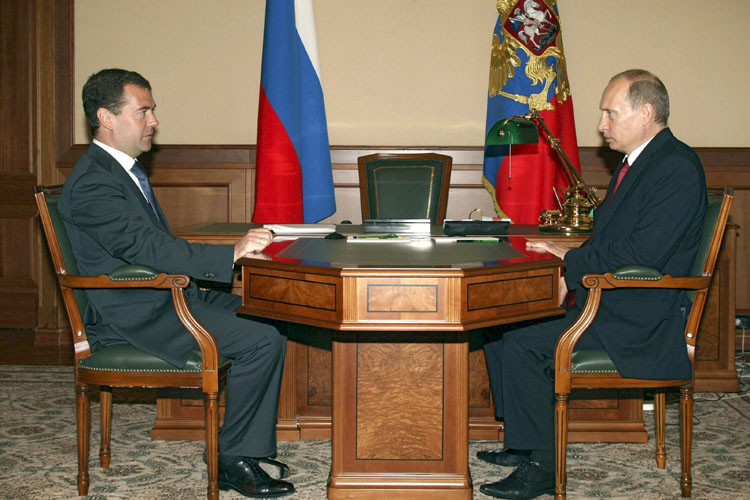 Russlands Präsident Dmitrij Medwedew und Regierungschef Wladimir Putin: Dass Moskau die Unabhängigkeit Südossetiens und Abchasiens anerkannt hat, wird vom Westen scharf kritisiert.
Russlands Präsident Dmitrij Medwedew und Regierungschef Wladimir Putin: Dass Moskau die Unabhängigkeit Südossetiens und Abchasiens anerkannt hat, wird vom Westen scharf kritisiert.
